Latest posts by Nancy Carr (see all)
- Hey Dullblog Online Housekeeping Note - May 6, 2022
- Beatles in the 1970s: Melting and Crying - April 13, 2022
- The Beatles, “Let It Be,” and “Get Back”: “Trying to Deceive”? - October 22, 2021

Peter Jackson’s “Get Back,” which was expected to be released in theaters this September, is now going to be a six-hour documentary on Disney Plus, premiering during Thanksgiving weekend. Variety reports that “each episode is approximately two hours in length, rolling out over three days, November 25, 26 and 27, 2021, exclusively on Disney Plus.”
So, more footage, but to watch it you’ll need a Disney Plus subscription. It will be interesting to see how all this plays out.


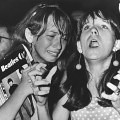
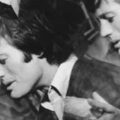
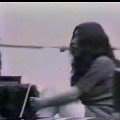
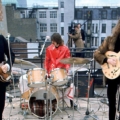
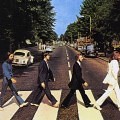
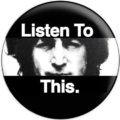
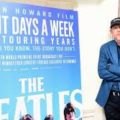
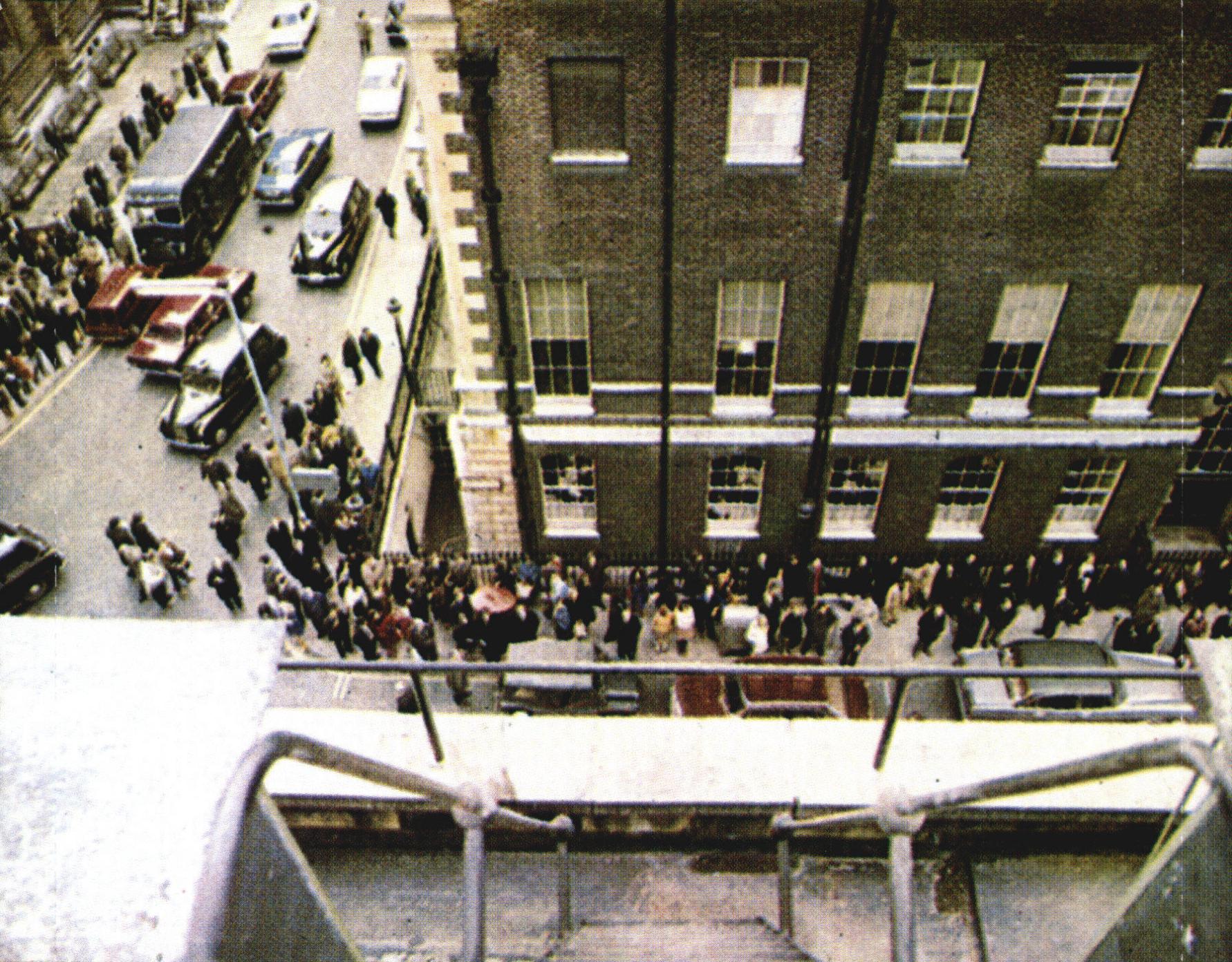
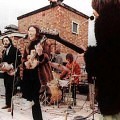

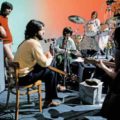
I am a little disappointed that I can’t go to the theater for this, because it would have been nice to share the experience with an enthusiastic audience. Part of me thinks they still could have made a shorter cut for theaters and then released an extended version on video/demand later!
.
But I also understand that the world is still having its share of troubles and big gathering events aren’t yet to be highly encouraged. Ah well, hello, Disney Plus, here I come.
I’m late to the party here but I totally agree with you. I wanted to see these beautifully restored images with people who were gonna be as happy as me.
Jackson made the decision to not use any of the footage seen in the original film. Imagine how great it would’ve been to experience this with a crowd of excited fans!
For those of us who don’t wish to subscribe to Disney Plus, I wonder if physical media will be offered at some point?
Do they even make DVDs anymore?
When I signed up for Disney I got the first month free from memory. I’m not sure if they still do that but if they do you could sign up and then cancel when the trial period finishes?
One thing I am concerned about though is through the Pandemic for Disney’s blockbuster releases they have been putting the app for an extra premium cost on top of the monthly fee – normally around $30 basically to make up for loss of box office- which you have to pay to watch during an exclusive period of a couple of months before it’s free to view. They did that with the live action versions of Mulan and Cruella.
I’m curious about whether they are going to charge an extra premium cost on top of the monthly fee for Get Back as it seems odd that they are realising the three parts on three seperate days rather then all at once as Netflix would have done. I think Disney is an inherently more greedy company then the other streaming service players.
Yes, believe it or not, DVDs are still in demand, along with digital downloads. So expect to see both at some point, although you’ll probably have to wait a while, since Disney will want to milk the subscription-only teat for quite some time.
It’s a pretty savvy move by Disney. If a million people subscribe just to see this movie (and I’ll bet it’s more than that), that’s $8 million to Disney even if they all cancel after a month. But some percentage of them will remain subscribers, either deliberately or through inattention. This is of course all factored in whenever they release something.
This is good to know, as I am without a blu-ray player. I only have an old macbook with a disc drive that plays DVDs.
I’m looking forward to everyone’s reviews of this documentary.
Although some may not want to subscribe to Disney+, one thing I like about streaming services is that you can subscribe for a month, which $8 in this case, then quit. If you think you might forget (I hate that!), you can usually quit right away. Sorry if this is obvious!
We had a “Beatle moment” in our house a few days ago.
A Beatle moment can be as simple as unexpectedly hearing a Beatle song over a store loudspeaker, or seeing someone in a crowd who is a dead ringer for George Harrison, or dusting off your bookcase and discovering an old Beatles biography you’d forgotten about.
Our moment came during a power outage. My wife and I were watching TV while our cat dozed. It was early evening, still daylight. When the power went out, we sat for a while and talked about the lack of proper infrastructure in our city (power often goes out, even when there are no extreme weather events to blame).
I picked up my concert ukulele and started gently strumming the chords to Do You Want To Know A Secret. Then, very quietly, I sang the words. My performance was for the cat, who was awake now and watching me intently.
My wife is unfamiliar with most of the Beatles’ oeuvre, so I didn’t expect her to recognize the song. But she started singing along! So now we were both singing, almost in a whisper, to the cat, who’d never heard a duet from us before.
Power was restored an hour later. We watched some more TV and the cat returned to her nap.
I should add that in 33 years of marriage my wife and I never sang a song together. I think this is why our cat was so fascinated.
What shocked me the most was my wife knowing the song. She’s not a Beatle person. I remember when she saw Paul Simon on TV and asked me in all seriousness if he’d been one of the Beatles.
Lennon-McCartney songs are fun to play on the ukulele. It’s an enjoyable hobby, and chord info is available online.
That’s lovely.
I was just playing/singing “Power Cut,” which I used to sing to my old cat, whom I miss so much. Dammit Sam you made me cry.
https://www.youtube.com/watch?v=2PSx8dJ0elQ
I remember getting choked up when you first mentioned her passing a few years ago.
If there is an afterlife, I expect to be greeted first by all the feline companions I loved in life. They’ll be the ones to introduce me to paradise. They’ll bring me to departed relatives and friends who’ll say “Really? Your cats first?”
We talk a lot here about John Lennon’s foibles. We know he could be a bastard, but there is one photo of him bumping noses with a Siamese cat. Have you seen it? I defer to that cat’s judgement regarding the basic soundness of Lennon’s character.
Agreed about beloved cats in the afterlife. Yes, John was crazy about cats, which was one of the bits of trivia on each Beatle that they used to print in teen mags and such, and which lived on for future fans just getting to know them. I have to admit John being a cat lover was one of the many things that had me leaning Lennon right from the start. Not only would John take the time to call Mimi regularly, but he would always ask about his cats. There is a saying: Artists like cats, soldiers like dogs. Which I don’t think Paul would appreciate, but… John liked dogs as well and I think Paul appreciated cats. In fact, the Beatles loved animals period. There is a cute picture of George holding a cat as well.
@Sam, that’s marvelous. I 1000% agree. I have never understood the belief that cats are standoffish; the cats I’ve known have been fiercely connected to their owners.
Lennon’s love of cats is one of the things I like the most about him; and I remember reading after his death that for days his two cats ran to the door expecting to see him. That is what I grieve about Lennon’s murder; all the ties of friendship and family that were sundered.
I think this is the photo that Sam is mentioning: https://www.facebook.com/99634791910/posts/john-lennon-october-9-1940-december-8-1980honoring-singer-songwriter-record-prod/10155701374206911/
I’m willing to bet that people who think cats are standoffish never had one. Dogs give everyone instant affection. With cats you have to earn their love, but when you do it’s for life.
Totally right. I’ll work up a Beatle Cat post.
Michael, either you or I have a serious problem: when I clicked “reply” I was taken to a site trying to get me to install a VPN (a private network, so no one knows what you’re looking at). These guys are clever enough to actually load the same page a few dozen times so you can’t just tap “back”.
It’s happened twice now – once when I tapped “reply” and once when I tapped in the “name” box.
Before we take any action, can any of your other readers say whether they’ve had a problem? I’ve only had this happen on HD.
Don’t panic yet Mike. I’ll help work this out.
Tony, what’s next steps on this?
Anyone else have this problem?
Nancy, could you alert Josh to this?
In the comments section every time I click a comment to go to the post I am redirected to strange pages. I had to configure my web settings to block those pages
and pop-ups, I thought it was just me.
I’ll talk to Josh today and see if we can figure out what’s going on.
I have had something similar happen on mobile, but never on desktop. I thought maybe it was actually an issue with my phone.
John owned much loved fox terrier, Sally, as a child. Later, in the Hunter Davies biography, a photo shows John with Cynthia and Julian, with another little fox terrier on John’s lap. Perhaps in the 70s it was difficult to own dogs at the Dakota so John chose cats? Having owned both dogs and cats it seems either species can be standoffish or not – just like us. It’s interesting that John had Siamese cats, which are often considered the most ‘dog-like’ of the cat breeds.
I think John would have chosen cats regardless. Yes, I remember reading about his beloved dog Sally. One thing that pissed me off about Mimi, and gives credence to the belief that she had a cruel streak, was that she had the dog sent away out of spite when John decided to stay at Julia’s for a couple days or something. John was devastated. Has anyone heard that before? I’ve had neighbors with Siamese cats so I’m somewhat familiar with them. I know they are the most vocal of felines. I knew one who was very social and visited our house all the time. I’m curious as to how they are the most “dog like” of cat breeds. I’ve known individual dogs that behave like cats. Paul by the way said that before Martha, he “wasn’t keen on dogs.”
P.S. Is it true that Paul gave John a pair of cats named Pyramus and Thisbe, or was that something the John/Paul slash community made up? I know John had two cats named Major and Minor.
@Michael and @Tony
I was just going to mention this. When I go to the HD main page I always use the drop down menu to check the Recent Comments. 90% of the time it redirects me to a page it opens up with some ad for a VPN service. It isn’t always for a VPN service, but most often is.
This is very odd as I don’t allow pop-ups in my browsers and I have all other security controls ratcheted down pretty tightly.
I am using a Samsung tablet with a variety of mobile browsers such as Opera, Brave, and Firefox.
The HD tab stays open and is functional, it is just that I have been redirected away from it to the VPN/Advertising site.
Has been ongoing for two weeks or so. Again, for me it is when I select Recent Comments on the drop down menu.
I also get the VPN page. When I click on a comment from the Recent Comments page, I get the comment in context and the VPN page in a separate window. I only use my phone and it started a few ago. (I also thought it was just me.)
@Nancy
One other item for your webmaster: I have pop ups blocked and, perhaps more importantly, am not always allowing Javascript to be run. It seems to me that there is an embedded script on the site but might be masked as being Javascript. In other words, it is not being detected as Javascript.
FWIW, I’m not seeing the VPN page any more…
I’m really looking forward to seeing this. And that is really, really weird!
See, when I was young I was not so much “not that interested in the Beatles” and more “aggressively Not Interested in the Beatles.” It was part of a little generational-angst thing I had going on. Younger people may find this hard to believe, but there’s no one who could more intensely hate the Boomers as a group than a young , disaffected Boomer/GenX cusper in the late 1970’s and 1980’s. They just have no idea.
The Beatles were part of that. They were a Boomer thing, and I didn’t like them. I *wouldn’t* like them. As for my opinions of the four of them as individuals at that time, I won’t go into it because it would just hurt people’s feelings.
But that all faded out with time, and I probably hadn’t given them a single thought in years. Then one day, the mysterious YouTube algorithm serves me up a particular Carpool Karaoke segment One thing leads to another, and six weeks later I’m lurking at a Beatles-specific blog and seriously contemplating questions like “Do I think John Lennon’s feelings for Paul McCartney were purely platonic, or not?” (Answer: not sure!)
Or, “Is it really possible to live that life for this long and still be something like a normal, functional human?” (Because it seems unlikely! And yet, there he is, and he looks like one anyway. I’m a bit fascinated by that.)
So, looking forward to this release, and it’s weird. I’ve never even seen the original Let it Be, except for snippets of that rooftop concert. I haven’t even listened to all of their music yet! A bunch of it, I’ve heard, just because I’ve been around and it’s been around, but there’s hardly any of it I ever really listened to with any attention until a few weeks ago. And some of it I’ve never heard at all, because I would have had to buy an album or or at least seek it out in some way, and I never have. I’m slowly working my way through the albums now, but I’m only up to Rubber Soul.
So I guess I’m going on a little journey here. Anyway, since I’m lurking, thought I’d say hi. Let’s see if this works.
I envy you your journey a great deal.
Not that you asked, but experiment with the simple story first—-watch The Compleat Beatles or something—-and layer in the other stuff. That way you’ll avoid the Internetting of the topic. The internet makes everything simultaneously sensational and very very flat; fascinating for a short time, but ultimately a dreary catalog of flaws and petty hypocrisies. The Beatles are profound, if you let them be.
Ah, hey, thanks for the suggestion! I actually meant to ask for something like that, something that might give me a good overview of what was going on.
Of course, I’m not really going into this with a blank slate, even leaving aside any internet browsing I’ve already done. Impossible not to pick up some knowledge and form some impressions even when I was the most Not Interested. I grew up with these guys just as much as anyone in the sixties did, really. They were still *everywhere*, it was just that it was less “peace and love” and more “b**ing and sniping”. That was my first impression of them, sadly…
I am going to try to be fair. In particular I’m going to try to be fair to John. I always disliked him in particular. (Yes, he died and that was sad. I didn’t dislike him *that* much. But still.)
If this is getting on anyone’s nerves, I apologize.
Lama, here’s a link to an earlier HD post with suggestions for newbies — hope you find it helpful!
Lama said: “I’m going to try to be fair to John. I always disliked him in particular.”
You’ve come to the right place. They’re only opinions. Feel free to state them, I say. You don’t have to be fair. I’d rather people trash John, or anyone, without saying they’re trying to be fair.
And yes, John’s feelings for Paul were probably as platonic as his feelings for his best friend Pete Shotton. Which isn’t to say he didn’t have romantic feelings for other men in his life. Why did Paul take a back seat to Stuart during the early days, when John and Paul’s friendship was probably at its strongest? I get the impression that Paul fans (who make up about 94% of the McLennon community) project onto John their own feelings for Paul, or try to validate Paul in some way by trying to prove that John was in love with him.
Oh listen @Lama: John is GREAT. I personally believe that–especially at the beginning, when age made a bigger difference–John’s personality IS The Beatles. So much that’s utterly great about early John is what’s great about The Beatles. Especially before May ’68, he’s handsome, charming, artistic, incredibly perceptive and articulate, super-funny, a great writer, a great songwriter, dresses well, and is surprisingly tender. Of course we learned later that the private Lennon could be quite awful, but for most of the Beatle years, there’s just not much to dislike. After all, the world fell in love with him.
Post-Maharishi, I like him vastly less. He mostly loses his sense of humor, is constantly trying on personas and looks and never seeming comfortable with himself, he’s both cynical and easily fooled, is both hyper-political and hyper-naive about politics, dismissive of life as it is lived by most of us, he is snobbish, bitchy, self-justifying, pushes one fad after another, and insists that everybody love his wife as much as he does. And STILL he’s a fascinating man who played an essential role in his times.
You know what book I’d recommend? “A Day in the Life” by Mark Hertsgaard. IIRC it’s a great, fluidly written standard take on the band. Then you can delve more deeply into the areas that interest you.
Another recommendation, thank you.
I don’t think I’m really a McLennon person. It’s interesting to think about as a possibility but I’m not really invested in it.
I think I can pinpoint part of my real problem with John, now that I’m thinking about it.I knew very few biographical facts about any of the Beatles, but here’s one I was well aware of: he had a son, just about my same age, whom he had abandoned. I held that against him. A lot. I think I identified with Julian a bit. The fact that he had another child later, on whom he showered attention, just made it worse.
And anyway, for me the great John of the sixties was something I missed, black and white pictures on the TV from another time. My present was the John of the seventies. Can you really blame me for not being as impressed? Imagine that the first you ever saw of him, in real time, was the Two Virgins thing, or soon after.
But I do mean to be fair, by which I mean I’m going to try to gain a more nuanced view. That should be possible.
At any rate, I really only came here because I just finished the White Album, and I just need to say: What the h***. What was that?
But I’m enjoying it. Some really great music is in there, including a couple of real surprises.
You know, I had that same gripe against John (I was born in 1969). It’s a fair point. The more I learned about the guy, the more I thought he was planning to make things right with Julian.
@Lama — thank you for sharing, and that’s so interesting, because I felt the same way as a kid! Not knowing much about the Beatles, all the John footage in the 70s made me think he was “the angry Beatle,” and I came to associate those granny glasses with mean people. The footage of the bed-ins frankly terrified me– all that hair and beards. When he was killed my babysitter was inconsolable and I felt bad that I’d disliked him in my mind, and thus I became the owner of “Watching the Wheels” and “All Those Years Ago” on ’45. It was only in later years that I saw more of John as a Beatle and learned more about him and why he’d been so well-loved to begin with, and saw how charming he could be.
@Laura
Have you cleaned out your cookies lately? I am seeing that after I clean them out the first time I go here the the HD site the VPN ad pops up again.
I’ve neither eaten nor cleaned up cookies recently, so the mystery deepens.
@lama No doubt John and Julian had a difficult relationship. Partly because John was on the road for half of Julian life while he was alive (and many rock musician have talked about the feeling of disconnect they have when they leave the touring environment and go back to a normal take the trash can out, mow the lawn, tuck the kids in at night life. )
Partly many speculate because of John’s own issues with his parents.
Partly because for a lot of Julians life John was a self destructive addict.
And partly I think it’s also important to note as a child of a pretty unpleasant divorce, and all the bitterness that comes with that, where one parent was living in another country that was constantly trying to deport him, wasn’t the ideal parenting situation.
But it’s not like he disappeared on his son for over twenty years of his life and then walked back in once his son became famous and he could ask him for money and houses.
John and Julian at least had a relationship as up and down as it might have been and their relationship had improved and seem to be healthier and closer before he died.
Julian loves his father and misses him today, he loves his little brother and he even seems closer to Yoko now. And John for all his flaws and imperfections also seemed to love Julian. The fact is John died right at the point where he seemed to becoming more emotionally and mentally equipped and was at the infant stages of having better relationships with Julian, with Paul, with his extended family etc that are now left unresolved. Julian himself no longer seems to have the same outrage fans do over his relationship with his father.
One of the most telling things in the John and Julian relationship for me personally is an anecdote Paul told where he was playing a game of make believe with Julian and noticed John was studying him and then genuinely asking Paul how he knows how to do that and be like that- essentially asking Paul how to play with his son. (As an aside and slightly unrelated note I also think it’s telling how after he died Paul mentions to Hunter Davies how John got possessive of baby Sean and didn’t like the idea of Paul holding him. Probably because by John’s own insecurity he once said he felt Julian wished Paul was his father but was stuck with John)
@LeighAnn, I mostly agree with what you’re saying about John here and in another thread, but John was only on tour until Julian was three, and Julian was 17 when John died – so nowhere near half of Julian’s life. Also, moving to New York and not providing for Julian as well financially as he could/should have are two issues I have a hard time excusing. The move was ostensibly made to find Kyoko, but how was it supposed to help with that enough (at all?) considering the adverse effect it had on his relationship with Julian? As for Janov, while I don’t necessarily feel moved to defend him, isn’t it impossible to say if he could have helped since John didn’t complete the treatment?
There’s no reply button. This is @Kristy. I’m just happy to hear that I wasn’t completely alone in this. John was the angry mean one: yes! Exactly. And the bed-in, with all the hair and beards and stuff. I was very seriously creeped out by the pair of them.
That’s still one of the first images that pops into my head when I hear their names. Them lying in that bed, being creepy.
I do realize that not everyone saw it that way, and that it was only a small part of their lives anyway, so I should get over it. In fact I’ll have to, or else give up on this whole little Beatles thing I’ve got going. And I don’t want to do that, at least not yet. There’s so much else about the whole thing that’s so interesting.
It’s so interesting too, how differently people can react to the same kind of social pressure. I wasn’t sad when he died. I didn’t see why I should be more sad about him than about anyone else, and I felt like everyone was trying to MAKE me be sad about him. And then like he was being pushed on me as some kind of hero, like “You MUST worship this man.” Really put my back up. I was such a little contrarian. 🙂
I think my best move now is to try and immerse myself in some early footage of them from when they were touring. He really was very charismatic at that point, I can see that. Any suggestions from anyone about the best way to go about that? Is that what Ron Howard’s thing was, or am I thinking of something else?
I get the same feeling when I see the McCartney mullets.
I would have thought a dose of empathy, rather than social pressure, would cause a person to recognize the tragedy of a man getting shot outside his home after work for no reason. How did people try to make you feel sad, because they were crying?
@Michelle, I know I’m definitely talking about being an actual CHILD when the 70s were going on, and therefore I’m assuming also @Lama. Other people’s distress obviously affected me and MY life more than the death of some famous guy, though I had very odd reactions to death in general as a kid. As an adult, yes, I can say “wow, that must have been traumatic for everyone who loved him.” I think it’s rather pointless to be surprised at how children react to extreme emotion on the part of other people.
I’d like to make an apology, specifically to Michelle but also to everyone with a love for John Lennon. I didn’t come here intending to trash him or cause offense. I was trying to work out a question in my own mind (specifically, “Why do I even care about this? What’s so interesting?”; and once I got started I think my comments ended up going to places they didn’t need to go. I’m sorry.
After having spent some time educating myself, I’m going to say a few more things and then I’ll leave y’all alone.
1. I might not ever get to a place of loving Lennon, or even necessarily liking him all that much, but I do feel compassion for him. He was in a pressure cooker, and there was nothing in his life that could have possibly prepared him for it. The same goes for all four of them, actually. The real wonder is probably that they all didn’t spectacularly self-destruct.
2. Of course a lot of my Beatles and Lennon hate was just—well, you know. I still see people, especially kids, doing this all the time. Something is very popular and people talk a lot about it, and in some folks that’s going to engender a backlash. I try to be understanding when I see other people doing it to something I love, because I do understand. Some of my talk about that, in my head, was more of a “ruefully laughing at my younger self” thing, but I’m sure it didn’t come across that way.
3. (Defending myself). I was a contrarian, I wasn’t a psychopath. I wasn’t *happy* to see Lennon dead, or happy to see people sad about it. When I knew someone, in person, who really was sad about it, I did my best to sympathize. I just didn’t share the sadness, or understand it. And I’d like to posit here that that wasn’t all THAT unreasonable. Can we at least agree that a lot of his public demeanor, in the 70s, wasn’t all that child-friendly? And I was a child.
I don’t think my REAL popularity-induced-backlash hatred kicked in until the 80s, anyway, after a few years of hagiography. I realize I compressed that timeline a bit in my previous.
4. The flip side—and this probably also really kicked in in the 80s—was a TINY soft spot for Paul McCartney. I felt sorry for him. Sure, he’d had some success, but everyone knew that no one respected him. It seems a bit weird to me now that while I was perfectly ready to question the idea that Lennon was a genius, it didn’t occur to me to question the related idea that McCartney was a hack who always tried to make himself seem more important. I more or less accepted that as true. It just made me always sort of want to pull for him, kind of like the way you do for that one kid on the soccer team who really can’t play but has a lot of heart and just keeps trying.
Sorry, I’m almost done. I know this is probably stupid but I’m just going to finish and then I promise I’ll go away. I finally realized what I’d found so fascinating about the Carpool Karaoke thing. It wasn’t the video itself. It was the way people reacted to it: positively. I mean, as I’m watching it, one part of me’s going, hey, this is cool, and the other one is all, OMG, I bet he got roasted for this. In the 80s he definitely would have been.
And then in my internet wanderings, it looks to me like the narrative around this band has really changed since the last time I paid attention to it. I find that absolutely fascinating. The old school story—Lennon was the creative force, McCartney was kind of a hack, Harrison and Starr were… there—it’s still around, but it doesn’t seem to be dominant (although it probably depends on which corners of the internet you go poking into). When did that happen? Has it been that way for a long time, or is it recent? And why did it change? And if that narrative was false, which I am convinced it was, then how the hell did it become so commonly accepted that even someone not really into the Beatles would “know” it to be true? I’m fascinated.
If anyone read all that, thanks for your patience. And sorry for any offense.
@Lama, no apology necessary. John Lennon has been dead 40 years and fans who “defend” him–or any other celebrity, but particularly THAT celebrity–are indulging in a dubious pleasure. John Lennon was a public figure; he said and did stuff in public; the public had a right to have opinions about those things. We all engage in a one-sided conversation with celebrities; that’s what being a celebrity is, consenting to that in exchange for the rights/benefits/license we grant to celebs.
Lennon’s determination to blur the lines between public and private invited opinions about him. This is a risky gamble, as he found out. It makes you fascinating, but also endangers. A lot of the showbiz stuff that The Beatles rejected so refreshingly were strategies developed since 1920 or so to make stardom tolerable. Lennon’s death at the hands of a crazy person doesn’t change the fact that he WANTED fans to have opinions about him, that’s why he spent so much time talking to the public (not singing, talking). To be a Lennon fan and not get one of his central tenets — that you shouldn’t think you know celebrities and that showbiz is fake — is troubling to me. If we don’t know him, and he would say that we don’t, what are we defending but a bunch of PR?
Lennon genius, McCartney fake, Harrison boring, Starr lucky was a media trope begun by Rolling Stone post-breakup and repeated endlessly after Lennon’s murder. That’s how it became the standard story. McCartney killed it by continuing to live and create, and generations less embedded in the political shorthand of Cool Lennon vs. Square McCartney began to assert their opinion.
I was just watching Antiques Roadshow on PBS and a woman showed a letter she’d gotten from John Lennon. I looked it up online and it turns out to be an episode from 2019. Anyway, the letter is from 1967, a few days after Brian Epstein’s death:
https://www.youtube.com/watch?v=2dNPd8Wv8gk
She wanted him to be her big brother, and he signed it “Your big brother.”
Thank you so much for sharing! I love that story. It just reminds me how Paul always says that their is a loving generous side to John or as Paul says he can be a big softie.
Off topic from this thread, but pertinent to a previous discussion, I noticed that your webmaster seems to have fixed the redirect problem when one clicked on the Recent Comments tab. I have not had it occur at all this past week.
This Guardian article was recommended on Tumbler today. The author John Harris has access to all the videos and 120 hours of audio of the Get Back session. He has written down all the transcripts. Wow! https://www.theguardian.com/music/2021/sep/26/beatles-final-days-get-back-let-it-be-john-harris-peter-jackson?CMP=Share_iOSApp_Other&fbclid=IwAR3-EQ0RpBiB_qCVlqzcomzkFW3nQT0yE_5ovrZ3L7JTMurbCm_jJ6GxOUY#comments
I am new here. Please forgive me if this is common knowledge.
As someone who has read a lot of commentary but is still fairly new to the Beatles, and hasn’t read any official books on them, should I watch the Let It Be documentary before this one? Does it matter? I know you all have differing opinions on this new one, but I’m curious, and you all are much more knowledgeable on the Beatles than I am. Thanks!
Erin, I can only speak for myself, but I would suggest watching the “Anthology” series before either “Let It Be” or “Get Back,” if possible. It puts this later period of the Beatles — which, unfortunately, is much better documented on film than earlier periods — in perspective.
Alternatively, I’d suggest reading a good group bio ahead of watching either (I think Spitz’s book is good, or the shorter version of Lewisohn’s), and/or reading at least parts of the Anthology book.
@Erin, I’d second Nancy’s recommendations. In fact, I would specifically NOT watch the Jackson documentary before watching Anthology, and reading an established group bio. Spitz is good; I remember Hertsgaard being very good, too.
Whatever else it is, the Jackson documentary is a response/riposte to much of Beatles fan and press discourse since 1970, and is about the single most contentious period of the group, with a few of the most hotly debated issues at the very core (John’s drug use, mental state, and intentions; the role Yoko played in it all). It seems to be offering a new angle on that period, and calling it definitive, both of which make me dubious. If someone in 1915 suddenly claimed to have proof that John Wilkes Booth didn’t shoot Lincoln, you should be dubious. The narrative around Get Back was in place no later than the May 1970 with the release of the movie, codified further in “Lennon Remembers,” and has remained more or less stable ever since. To change it now would take a lot lot of really indisputable raw data. The principals at the time were saying one thing, and this doc seems to be saying another. Red flag.
If you want to forge your own understanding of these issues, whatever it turns out to be, you shouldn’t come to Jackson cold. Images are very persuasive, and editing is hidden — and there are several powerful commercial motivations here that any thinking fan should factor in. Whenever the Beatles are talking about themselves in Official Beatle Product, having good context is key if you want to engage with the material.
The other alternative is simply to watch and enjoy it, and not parse any of this stuff. That’s also entirely valid. Just know which you’re doing, and why.
Michael, and Nancy, thank you for the recommendations! I’ll look up Spitz’s book and the Anthology series. Lewisohn does intrigue me too, as from what I’ve heard he’s done a lot of research.
Michael, it’s depressing to think about the editor cutting the film a certain way, but thanks for reminding me to be aware of this. I tend to be much too believing of other people’s perspectives. I would love to come at this film without analyzing it, but I know myself–thats going to be impossible.
Others have said “Let It Be” was a bit too negative, but it sounds like you (Michael) believe that narrative is largely true. Am I understanding you correctly? I’m fascinated by how divisive “Let It Be” seems to be even now.
I wish we could know that Jackson was just showing us all the extra footage, cleaned up, with no agenda. But I suppose every creator, including myself in my own writing, has a goal/purpose, and thus a bias.
@Erin, couple things:
Every creative project is the construction of a narrative out of the chaos of data. This very much includes journalism, documentary, and history. The narrative is not, and can never be, reality; at best it can illuminate an aspect of reality which you will then understand better in your mind.
Every creative project reflects how/who it was funded, and the biases of its time. Peter Jackson’s WWI documentary existed to 1) laud the common soldiers of WWI, and 2) make modern audiences feel kinship with them by making them “look real” (ie, in color and sped up). These are reasonable goals but they are intimately connected to who was funding the project and why, and who was providing the raw footage and why (the Imperial War Museum). And that film was inherently political — as this one will be, too. Look at how Lennon is portrayed, and you’ll see the politics; he’s a lightning rod for left and right.
The creation of any item is a social process–it is shaped by the desires/opinions/skill of a group of people. “Let It Be” was not the truth; “Get Back” will not be the truth. Both are, at best, sincere attempts to show reality as it was in January 1969. The fact that they are for-profit makes this less likely; the fact that people really care about The Beatles makes it less likely. The fact that Paul, Ringo, and Yoko are still alive makes this less likely. In a capitalist society, truth can only be told if it sells.
The “Beatles with their trousers off” ethos of “Let It Be” was very much an ethos of January 1969. (And it was very “New Showbiz.”) The ethos of our current time is to have a much more nuanced, often self-pwning relationship with the truth of celebrities. Stars big and small are very adept at seeming to show truths, while maintaining a very carefully constructed public image. The very fact that “Get Back” is coming out now, instead of 1995, makes me wary of it; Anthology had some rough edges that made me trust it. Big media companies have gotten a lot better at giving the public faux-revelations, and have had 30 more years’ practice fine-tuning “the star as product.” And audiences today aren’t really interested in “Beatles with their trousers off.”
Finally, the mere fact that “Get Back” is appearing 52 years after the fact, rather than 18 months, makes it less likely than “Let It Be” to be close to the truth. The world is a very, very different place now, and the idea that a 2021 brain could sync up with a 1969 event very well is very unlikely. “Get Back” will be–at best–a 2021 interpretation of an event in 1969. And that is why it is being made today; the end of the Beatles’ story, as told in 1970 with “Let It Be,” is dissatisfying to the principals of Apple. It is also dissatisfying to some fans–hence “divisive.” This is weird to me.
When I was coming up in the Beatles fandom, nobody had any problem with “Let It Be.” We didn’t like it — how could you? — but we didn’t think it was lies. We didn’t have the same relationship to our obsessions as people do today. The Beatles made this movie, it seemed to show certain things, you might have opinions about those certain things, but it was accepted as the movie The Beatles gave us, and thus as factual as the tracks on Revolver. Now, fans have a very different relationship to all this stuff; there’s definitely a sense of “fan as customer” working here. A significant number of fans don’t like the story, so Peter Jackson has been brought in to see if there’s another story in the footage, one that fans will like more. And pay for — while at the same time, the Official Narrative becomes a little more forgiving. Paul will be less bossy, Yoko less weird and controlling; both will be more sympathetic. Like those WWI soldiers.
This may seem utterly cynical on my part, but recognize that this wouldn’t be happening if a different story couldn’t be made out of the footage. No one would be paying Peter Jackson to make a 6-hour cut of “Let It Be.” A different, more pleasant, more marketable narrative is why this movie exists; but that’s not a value-neutral thing, regarding history. Considering the January 1969 sessions as pleasant, happy, productive–this is a major revision to the story, as if the Sgt. Pepper Deluxe Edition contained a bunch of tracks that sounded like Nirvana. A positive spin on the “Get Back” sessions, while more sellable and certainly more comforting to Paul, Ringo and Yoko in their dotage, actually deepens the mystery of the breakup, and suggests that Lennon was even more culpable. If the group was naturally growing apart, then John didn’t have to do much extra to get his divorce; but if it was still basically functional, well…
To answer your question if I think “Let It Be” is essentially true, I would say that I find it odd that this is even a question. It has been the only data we have on the period, along with interviews after the fact. And the film, and the interviews, told the same story. I think we should be very careful, because The Beatles’ history is now in the hands of the members of the group who were more likely to be politic, and the two members who relished telling “the inside story” are now dead. And Yoko, who came off so badly in “Let It Be” that she was considered the villain of the breakup — the first time I saw “Let It Be” in the theaters in 1978 or so, she was actually booed and hissed whenever she came on the screen — the Jackson documentary is an excellent attempt to rehabilitate Yoko’s reputation. Something she surely desperately wants before she dies.
I never believed that Yoko was the sole cause of the breakup; but if one says that the narrative of “Let It Be” was showing four friends who were thoroughly sick of each other, sick of the pressures of fame, making music at a low creative ebb (I simply don’t like the MUSIC of “Let It Be”), I always bought that 100%. Not just because of the movie, but also the interviews after, and the bitterness after, and the bad-vibes bootlegs, and — “Let It Be” explains the breakup, which is I think what it was meant to do, ultimately. And while Jackson’s super-cut of happiness might sway me a bit, you still have to deal with all the interviews, particularly with John and George, which confirm the earlier movie. What I wish happened doesn’t enter into it; The Beatles aren’t the MCU — fans can’t make the story into what they wish, and call it canon. For that, they need help, and I think that’s what Jackson is providing here.
Erin, I would suggest reading the official biography, The Beatles, by Hunter Davies if you can. It was the very first book, and although it glossed over several things (drugs, infidelity, etc.), you get a sense of how the Beatles were before the unpleasantness and revisionism crept in. I think it’s important to get that perspective. Davies showed no particular bias or agenda towards any of them and there is a sense that they at least trusted him. He seems to meet neither the aggression of John nor the guardedness of Paul, for example. There is a good insight into their songwriting process as well, mainly the Sgt Pepper and post-India eras.
Lara, interesting, and thank you for the recommendation. Perhaps I’ll tackle Davies’ and Spitz’s books both.
I’m excited! First impression it seems like it is going to be less about the drama and more about just how hard they worked even when they all were ready to quit and probably half hated each other. I mean didn’t they write something like 57 songs between during the Let it be sessions?
https://www.instagram.com/tv/CU-RYPujrFa/?utm_medium=copy_link
Official trailer
https://www.instagram.com/p/CU-uksPq8K-/?utm_medium=copy_link
Official poster
https://www.instagram.com/p/CU-urijqSna/?utm_medium=copy_link
Official tie in book
LeighAnn, are you confusing 57 songs with the 57 hours of footage from the Let it Be sessions?
Anyway, that trailer looks amazing.
I swear I read somewhere, I think maybe in one of the articles promoting the upcoming film/series, that between all of them they worked on 57 songs during this time that they went on to use both in Let it Be, Abbey Road and their solo albums. Like it was actually a very productive time for them. I’ll try and see if I can find the article again.
Do try to link to sources. It makes comments better.
Interestingly, Jem Aswad’s review in Variety makes the same point I did back when this post was new: this film should sit beside “Let It Be,” not replace it.
Relevant quote: “So how did all of this incredible footage not go into the original film? Maybe the original “Let It Be” was a narrative of its own, and “Get Back” is the counter-narrative. And as in life, they’re both true.”
I started listening to the Let it Be Deluxe (Giles Martin) Edition and seriously some of their rehearsal and jam recordings of songs on the Deluxe editions of their albums sounded better then the ones that made the records.
The Beatles rehearsing All things must pass makes me think Paul and John had rocks in their heads to not want that on Abbey Road. I wish Paul and John’s relationship wasn’t in such an awkward place in that period because they both sounded amazing singing Oh Darling together- you could tell John loved that song, and it makes me remember how Paul said he always wanted to sing with John on Come Together but didn’t want to ask.
I think it best to look at the whole six hour footage of Peter Jackson’s new film before jumping to conclusions. Having sat through Michael Lindsay-Hogg’s depressing, dishonest film in May 1970, the lasting memory I have of it is people walking out in silence. It was over. Nobody talked about the Beatles again. It wasn’t that the Beatles were uncool – that was always a pretense- but in the 70s and 80s, living in the past was. What was the case in May 1970 wasn’t the case in January 1969, when the Beatles were a still-functioning band looking ahead, and discussing their next album despite the tensions, despite the drug addiction, despite everything. The discord that was to rip them apart was still weeks away. The film never served its purpose; the cynicism of the timing was appalling and the protagonists themselves had stopped caring. I doubt if anyone around them cared either about the turmoil each of the four were going through. The project should have been shelved. Instead it became an ugly carbuncle on the history of the Beatles that’s lasted 50 years too many. They were a rock band. They broke up.
Well-said, @Lara, but in what way was “Let It Be” dishonest? It seems to line up perfectly with “Lennon Remembers,” for example, and Lennon’s memories in 1980 as well.
“Let It Be” was not the Zapruder film; it shows exactly what the people involved said happened. It’s a drag, which is why I’ve only watched it twice, but to claim it is inaccurate–as people will doubtless do, pointing to Jackson’s 50-year-later edit as “proof” –seems like a stretch to me. It’s not the ending to the story we wanted, but that doesn’t make it false. If it were false, Lennon in particular would’ve said so, because he was in that mode in 1970/71.
@Michael G. It’s interesting that you mention how perfectly “Let it Be” lines up with “Lennon Remembers.” In Jann Wenner’s bio “Sticky Fingers,” he recounts going to a screening of “Let it Be” with John and Yoko in the lead up to the interview that would become “Lennon Remembers.” So I wonder how much of what Lennon said in the interview was actually coloured by his having recently watched the film versus the actual lived experience.
Interesting thought but didn’t Wenner note that John cried when Paul came onscreen? Unless those were tears of anger, it leaves a much different impression than his iconoclastic 1970 interview.
Yes, that section in Sticky Fingers was very much in my mind as we’ve talked about the original “Let It Be.”
FWIW, Wenner disavowed the book after it was published…not unlike Lennon’s own falling-out with Wenner in 1971.
I don’t want a false narrative to the demise of the Beatles anymore than anyone else. We all know it ended in acrimony. We can’t change that. What was dishonest about Let It Be was how it portrayed Paul as the the prime instigator of tension and discord within the band. And it was something that was manipulated retrospectively because of how events played out in mid to late 1969 and 1970. Every single person I know who saw the film at the time had it in for McCartney. Later commentators have attempted to deny any prejudice but try telling that to grass-roots fans. That’s WHY the Beatles break-up became the single most contentious issue, along with Yoko Ono’s involvement, pushing fans into the camp of whatever Beatle happened to be their favorite. It’s time it stopped. Look, I’m no documentary maker but even I know there are such things as disclaimers. What would have sufficed would have been a statement intimating that the film recorded the Beatles during a certain time at a certain place and did not reflect the rapidly deteriorating situation that followed. Was it really that hard?
One question that could have been asked of John Lennon: on any one day in January 1969 did he know EXACTLY how things were going to turn out for him and the others a mere few months later? Weeks even? Was he psychic? What Jackson has unearthed in the vaults is just as valid as what was selected for Lindsay-Hogg’s film. It is illogical for it not to be, and has nothing to do with ‘proof’ either one way or another. I don’t blame any of the Beatles for remembering these days as hell. I also don’t want Paul and Ringo teary-eyed with golden memories of the time either, but I truly think that’s tied up with grief and loss. They were the ones who went through it, not us. There are already anguished cries of revisionism by McCartney’s detractors, accusing a damaged man of standing over Jackson’s shoulder dictating what is to be included and what isn’t. Bloody hell, we haven’t even seen the film yet! Jackson is not stupid and he’s no fool. I think what people are really wanting from his film is proper context, not proof, and I for one hope he delivers.
I have to think 6 hours of footage is a more balanced and honest portrayal then 80 minutes of condensed footage.
Plus if you believe Jackson, he said there was no edict from either Apple or any of the Beatles/Estate heirs (Olivia/Sean).
“I have to think 6 hours of footage is a more balanced and honest portrayal then 80 minutes of condensed footage.”
Not necessarily. It’s all in the editing.
With any documentary, and I’ve been privy to a few, you must remember that it’s an act of filmmaking, not raw footage. Every documentarian comes to the subject with opinions, a need to tell a story, etc. Michael Linsday-Hogg did; Jackson did, too. It’s really up to the viewer to identify where the bias might lie.
As to an edict from Apple, he literally CANNOT say that there was one. There may not have been, but admitting that there were directives would taint the project horribly. So it’s really up to the well-informed Beatle viewer to make that call, after watching it.
I’m just amazed at how brilliantly it was restored. I know nothing about technology and HD whatnot, but I love seeing it used to its full potential. I’ve seen Jacksons brilliant WW1 documentary and watching this trailer it’s as if that entire time period has been brought back from the beyond allowing us to experience it as if we were present
I think we all know the trajectory the Beatles were on at that time. What does the whole of the footage represent if we were to watch all 50+ hours of it, probably a sullen group drifting further and further away from each other, stretches of apathy, distrust, going through the motions, tension, and rapid out of control drug use by one of its members. A drag
But the Beatles demise wasn’t a total freefall. Like a marriage(or any relationship) that goes from stable/strong to divorce within a year. You still get the little blips of happiness and harmony even though the arrow is pointing hopelessly downwards. (Maybe not the best analogy to make considering White Album was also quite contentious.)
That’s what I want to see. Was he able to find 6 hours of humor, love, camaraderie, cohesiveness, and that classic Beatles magic.
I also recall reading John crying while he was watching Let it Be. Perhaps deep, deep down inside, and something he could barely admit to himself, he knew it wasn’t always the big misery fest as it’s since been made out to be. But by then it had gone too far, and all four were consumed with pride and anger. All the books and biographies in the world can never tell us how they really felt unless one is a mindreader.
@Lara And the problem is that whenever John did try to recollect or explain how he felt, it was always informed by whatever heightened (and often volatile) emotion he was experiencing either when he was retelling it, or that he was recalling from the past. So at different extremes you get the raw post-primal scream Lennon of 1970 absolutely seething with contempt for everything and everyone; or the temporarily stable late ’74 variant in a much mellower mood and almost willing to sentimentalize the things and people he seemed to despise a few years previous. (By contrast, 1980 interview John is mostly performative and therefore of less value as a narrator altogether.) I think one of the reasons that John resented Wenner publishing the 1970 interview in book form (aside from any fiduciary aspect) was because the part of him that recognized the transience of his (negative) emotions did not want them memorialized in a permanent form. (As a magazine, he probably assumed it would disappear in time or become less widely accessible.) In 1974 when Glynn Johns visited Lennon and May Pang, Johns was hurt from comments in the 1970 RS interview. When GJ mentioned this, Lennon acted perplexed that anybody would place so much import in what he himself dismissed as just letting off steam (while half out of his mind.) This is not dissimilar to the way he backtracked on How Do You Sleep? after the fact. (Of course, in that case he could not alter its permanency, so he tried to alter its meaning and intent.) John wanted the freedom to rant on a public soapbox when the volatility of his emotions was too great to contain. His failure was that he thought he could do so without consequence. Believing his words would dissipate on the wind or not be given prolonged regard by the people they hurt damaged a lot of his relationships, and ultimately (further) damaged himself.
@Matt, didn’t George Martin have the same experience with John — expressing hurt over John’s 1971 comments, and Lennon apologizing later, seemingly surprised (!) that Martin took it personally?
“I think one of the reasons that John resented Wenner publishing the 1970 interview in book form (aside from any fiduciary aspect) was because the part of him that recognized the transience of his (negative) emotions did not want them memorialized in a permanent form. (As a magazine, he probably assumed it would disappear in time or become less widely accessible.)”
I agree with this 100%.
John Lennon is the most difficult public person to uncover that I’ve ever encountered, and this includes shifty politicians, spies and people from thousands of years ago. Whereas most historical figures are hard to read due to a paucity of data — they kept their opinions to themselves — Lennon gives the exactly opposite problem: he expresses so many opinions, even contradicting himself, all with so much sincere conviction, that it’s impossible to figure out what he really thought. That is, who he really was.
Most of the discussion over the last five years of this blog is centered around this problem. And it is a problem, if you are looking for a Lennon, or even a Beatles, that is bigger than fan service (ie, what one personally likes/agrees with).
The best I think one can do is use the statements as guideposts while developing a coherent Lennon gestalt.
“Every documentarian comes to the subject with opinions, a need to tell a story, etc. Michael Linsday-Hogg did; Jackson did, too. It’s really up to the viewer to identify where the bias might lie.”
If I might pass along a compliment to @Michael, @Nancy, and the other contributors to this site, it is you who help many of us viewers to better understand such books/documentaries/etc. by discussing and weighing the facts and context. It is much appreciated as it helps us keep a fact-centered perspective and not be lured in by an author’s or documentarian’s biases.
Not that I ascribe malintent to the producers of any one film or book, but the types of discussions I am finding here are an indispensable adjunct to the understanding process.